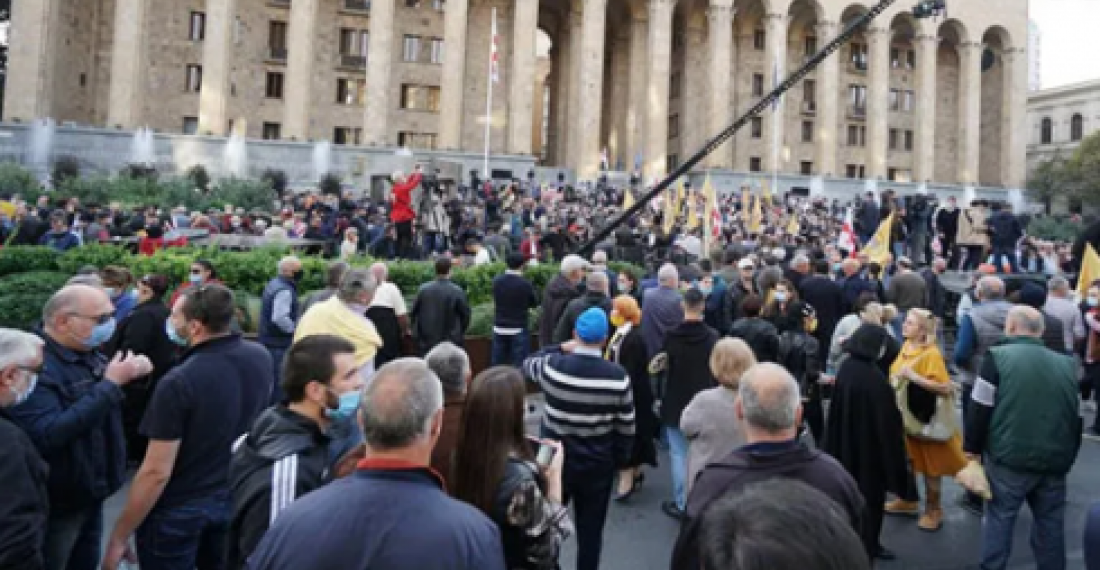This story will be updated throughout the day
1330 CET (1630 Tbilisi)
Opposition leaders appear adamant in rejecting the result of Saturday's election. They are gathering in front of the parliament with supporters. Some opposition parties have already declared they will boycott parliament.
International and domestic observers have reported a rather mixed set of observations. International observers highlighted that it was a free election with shortcomings, but local observers are more critical of the process.
Some interesting information from ISFED, one of the most credible domestic election observation organisations in Georgia. They conducted parallel vote tabulation (PVT) for the proportional, party-list vote in the October 31 parliamentary elections. Their results largely coincide with the official results based on 3409 precincts from 3847 (88.61%).
The largest gap is in the share of votes received by the ruling Georgian Dream party, where the PVT result is 3 percentage points lower than the CEC result so far.
1300 CET (1600 Tbilisi)
The international observation missions that followed the parliamentary elections have said that "Georgia's parliamentary elections were competitive and, overall, fundamental freedoms were respected. Nevertheless, pervasive allegations of pressure on voters and blurring of the line between the ruling party and the state reduced public confidence in some aspects of the process". "The elections were conducted under a substantially revised legal framework, following broad public consultations that brought some improvements for the holding of democratic elections, but further efforts to address shortcomings are needed."
They presented their findings at a press conference in Tbilisi this afternoon.
You can read more on the OSCE website here
The full statement is also available on the OSCE website, here
0730 CET (1030 Tbilisi)
Georgia was thrown in political chaos on Sunday (1 November) after opposition parties rejected the results of the parliamentary elections held the previous day, describing them as illegitimate, and calling for street protests.
Domestic election monitoring organisations - Georgian Young Lawyers Association, Transparency International Georgia and ISFED were critical of the process on election day, citing a number of violations.
Early signs of problems ahead emerged when exit polls commissioned by the political parties themselves, or by TV stations aligned with them, gave widely differing predictions, allowing both sides to claim victory. When official results started coming in however, the ruling Georgian Dream party appeared to be receiving more than 50% of the votes cast, and the opposition immediately cried foul. According to the latest data based on results from about two-thirds of the constituencies 2556 out of 3847 precincts), the result is as follows:
"Georgian Dream - Democratic Georgia" - 48.8%
"United National Movement - United Opposition is a force in unity" - 26.07%
"European Georgia - Movement for Freedom" -3.79%
"Alliance of Georgian Patriots" - 3.23%
"Strategy Builder" - 3.14%
"Try - 3.23%
Girchi - 2.99%
"Aleko Elisashvili-Citizens" - 1.38%
"Georgian Labor Party" - 1.03%
" Nino Burjanadze - United Georgia-Democratic Movement" - 0.85%
The results being contested relate to the 120 seats elected by proportional party lists. There are also 30 seats elected by a majoritarian system, where the picture appears more nuanced. In all eight constituencies in the capital Tbilisi none of the candidates has overcome the 50% threshold and there will have to be a second round between the candidates of Georgian Dream and those of the main opposition party, the United National Movement. There is a similar situation in some of the other 22 constituencies in the regions.
The opposition has called for street protests starting at 16.00 hours today. The international monitoring missions will also hold a press conference this afternoon to report their findings.
source: commonspace.eu with agencies
photo: Zaal Udumashvili, one of the leaders of the United National Movement party, gestures as party supporters gather in front of the parliament building after exit polls were announced during parliamentary election, in Tbilisi, Georgia, October 31, 2020 (picture courtesy of Reuters, London)






